‘It’s time to speak up’: Businesses in north Minneapolis oppose light rail plan on West Broadway Avenue
After more than a year of community engagement and “anti-displacement” efforts, a key group of business owners is publicly opposing the plan that could send trains down West Broadway Avenue in Minneapolis.
Metro Transit is working to expand the Blue Line from the Twin Cities to Crystal, Robbinsdale, and Brooklyn Park.
Kristel Porter, Executive Director of the West Broadway Business and Area Coalition (WBC) says opposition to the project was unanimous during a recent meeting with 28 of her members.
“I asked them, ‘Who here wants the light rail to come down West Broadway?’ Not one hand was raised,” Porter said.
In an open letter posted to WBC’s website last month, the group outlined six points in its opposition to the Blue Line Extension Light Rail Transit Project.
Among the chief concerns is the possible displacement of Black-owned businesses in what has been defined as a “cultural corridor” as well as “undefined, poorly-communicated impact to existing buildings.”

One concept map for the Blue Line on West Broadway highlights the Les Jolies Petite School of Dance for “conceptual building removal.”
“I’ve been a staple in this community — right here in this same location for 25 years. I’m very concerned,” said owner Dr. Sharon Cook. “If they give me a relocation package, if they offer to build me a building double this size, you know there are other things that are more important.”
The Metropolitan Council declined a 5 INVESTIGATES request to interview Chair Charlie Zelle about opposition to the project, but in a statement, Metro Transit said it is “still early in the planning and design process.”
An alternative to put tracks one block to the north, on 21st Avenue, is still on the table.
“We look forward to continuing ongoing work with members of the West Broadway Area and Business Coalition, as well as businesses and community partners throughout the corridor, to address potential concerns and maximize community benefits of light rail,” a spokesperson wrote.
Ongoing opposition
This is not the first time people in north Minneapolis have voiced concerns about the potential route of the Blue Line extension.
Last year, homeowners in the Lyn Park neighborhood objected to sending trains down Lyndale Avenue over concerns about crime, safety, and access.
At the time, the Met Council and Metro Transit cited the ongoing work of an “anti-displacement work group” and other advisory committees formed to avoid negatively impacting communities of color.
Porter and others say they continue to worry that the Blue Line extension could do similar damage to north Minneapolis that construction of Interstate 94 did to St. Paul’s Rondo neighborhood in the 1960s.
“When they put that highway through that neighborhood, they destroyed those families’ legacies,” Porter said. “With the little bit of social capital that we have, we’re finally gaining ground, and you’re going to put something in the middle of the street to divide us from each other.”
Metro Transit says it still does not have a specific date for finalizing the route of the Blue Line Extension Project, but the agency targeted “winter 2023-spring 2024” for selecting a “preferred option” and obtaining formal consent of the cities through which the light rail line will run.
For Dr. Cook and her husband, Bishop Larry Cook, the stakes have never been higher. In addition to the dance studio, the couple also runs a church, barbershop and a gas station on the same block.
“Consider the children. Consider the area,” Cook said. “Have some compassion, put yourself in that situation and remember that we do mean a lot to this community.”
While trains are not expected to begin running for at least five more years, Porter said her members do not want to wait until it is too late for their voices to make a difference.
“They said, ‘It’s time to speak up. We have to take a stand.’”